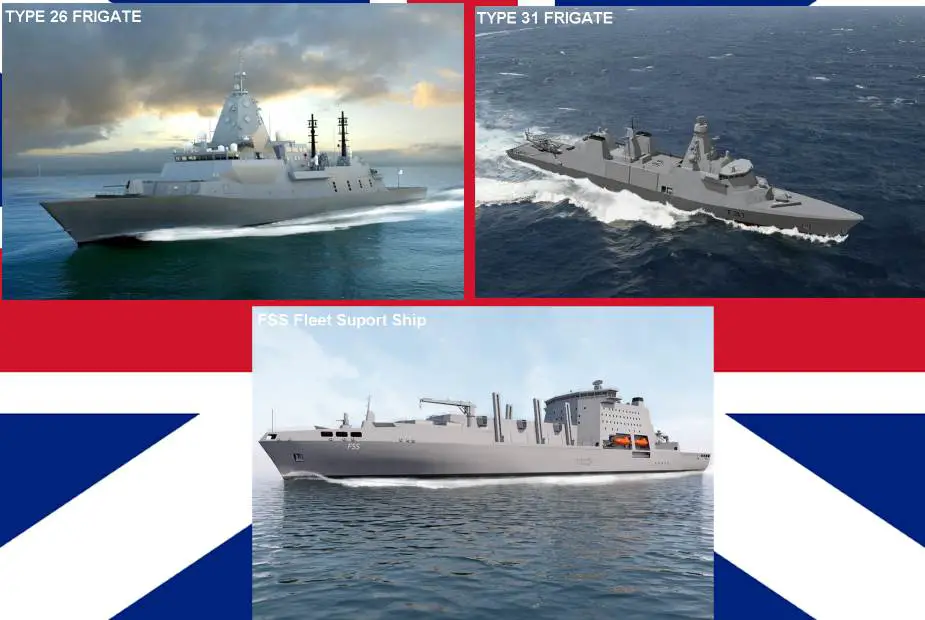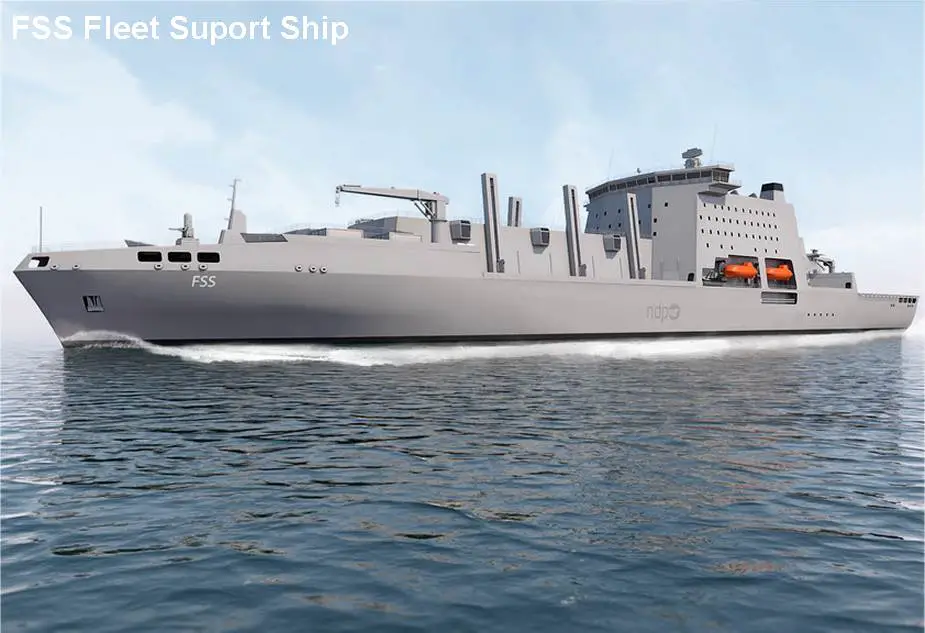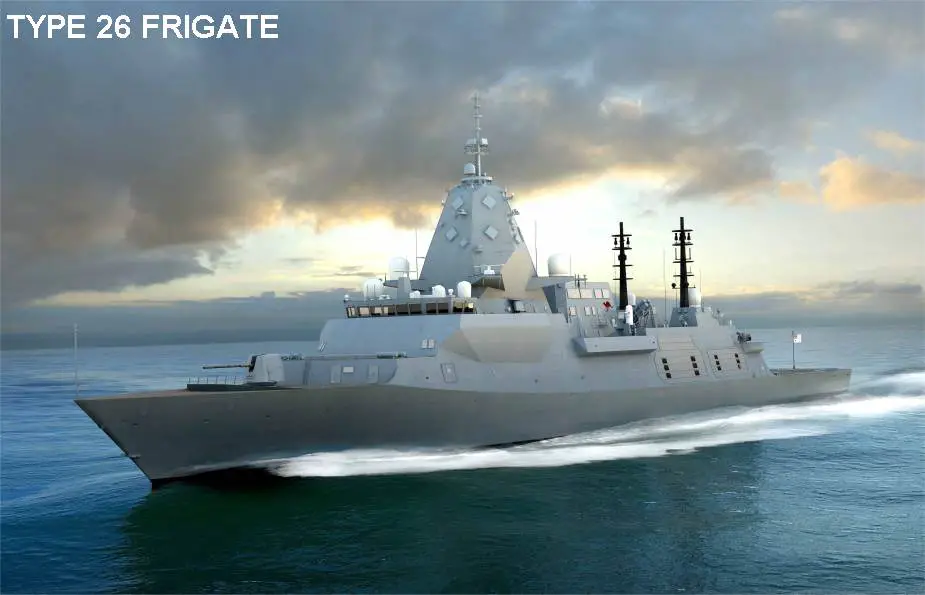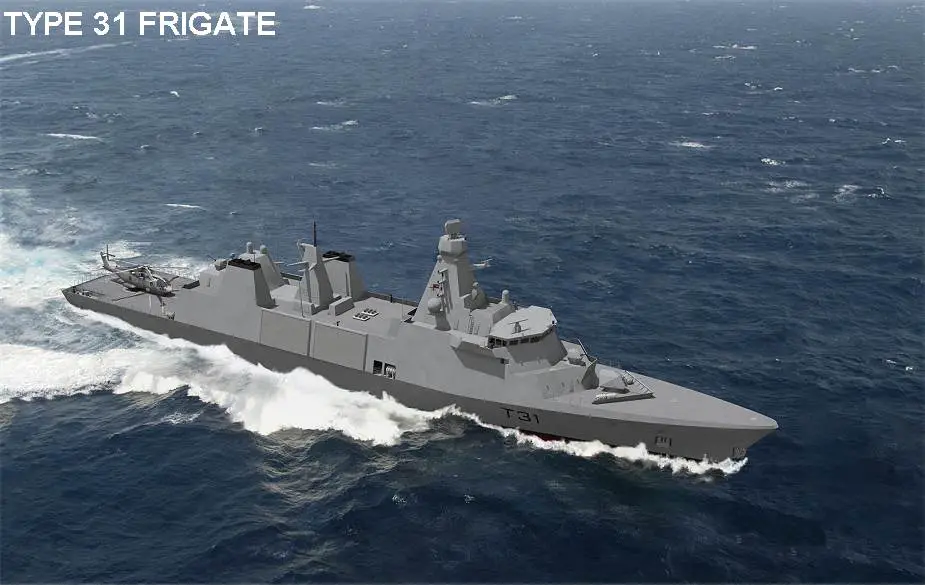Breaking news
British Navy plans to introduce three new class of vessels Type 26 - 31 frigates and Fleet Support Ship.
According to a report published by the UK’s House of Commons Defence Committee on December 14, 2021, in 2027–28 the British Navy’s current plans are to introduce three new classes of vessels (Type 26, Type 31 and FSS Fleet Support Ship) simultaneously. The British Minister for Defence Procurement described the planned transition in which Type 23 frigates will be replaced by Type 26 and Type 31 frigates.
Follow Navy Recognition on Google News at this link
 British Navy plans to introduce three new types of ships in 2027–28.
British Navy plans to introduce three new types of ships in 2027–28.
Citing the British Defence Committee report, Admiral Radakin noted that one of the big challenges of the transitions between classes is likely to be to the need to crew both old and new vessels simultaneously for a period. He reported that due to positive recruitment numbers he was optimistic about the British Navy’s ability to do this.
The Type 26 and Type 31 frigates face project specific challenges from the design and build of first of class vessels. BAE has provided British Defence Committee with an overview of specific risks in the Type 26 program and explained the measures they have put in place to manage them. These include supply chain risks, engineering or software design not maturing in time, issues with integration of equipment, and COVID-19 impacts.
David Lockwood, CEO, Babcock, confirmed that the Type 31 program faced many similar risks, in addition of the start-up risk of a new dockyard. Glynn Phillips, Group Managing Director, Maritime and Land, BAE, also informed us that the Type 26 program had had historic issues with the “first of class gear box”, including difficulties meeting the exacting specification for operating extremely quietly. He believed that these issues had been resolved but noted the gear box was still going through testing.
In September 2021, the British Ministry of Defense had announced the award of Competitive Procurement Phase (CPP) contracts to four contenders to develop their design and construction proposals for the Fleet Solid Support (FSS) ships project. In May, the British MOD launched a £1.6bn competition to acquire three new FSS ships that will keep the Royal Navy’s two new aircraft carriers stocked with supplies while at sea. Selection of the preferred bidder is expected by Q4 of 2022, with a build contract expected to happen in May 2023.
The four consortia awarded CPP contracts include Larsen & Toubro, which includes UK company Leidos Innovations, Serco /Damen, which includes UK company Serco, Team Resolute, which includes UK companies Harland & Wolff and BMT and Team UK, which includes UK companies Babcock and BAE Systems.

Artist rendering of future FSS Fleet Solid Support for British Royal Navy.
The FSS program is meant to find a replacement for the Fort Class support ships. The need for the ships and their potential role in a national shipbuilding strategy was identified in 2005. However, as a result of numerous delays and u-turns by successive governments, the competition to procure them is still ongoing and there are concerns that they will come in late and that they will either be built abroad or, if they are built in the UK, would strain the capacity of UK shipyards, which are also attempting to deliver the Type 26 and Type 31 frigates at the same time. This has turned what should have been the cornerstone of the fleet and the UK shipbuilding industry into a millstone around both their necks.

Artist rendering of future Type 26 frigate for British Royal Navy.
The Type 26 or City-class is a class of frigate being built for the United Kingdom's Royal Navy, with variants also being built for the Australian and Canadian navies. The program, known as the Global Combat Ship, was launched by the British Ministry of Defence to partially replace the navy's thirteen Type 23 frigates, and for export.
In July 2017, BAE Systems had been awarded a contract by the UK Ministry of Defence worth c£3.7 bn to manufacture the first three ships for the Type 26 Global Combat Ship program.
The Type 26 Global Combat Ship will be a world-class anti-submarine warfare ship and will replace the anti-submarine variant Type 23 frigates. Globally deployable, it will be capable of undertaking a wide range of roles from high intensity warfare to humanitarian assistance, either operating independently or as part of a task group.
The Type 26 frigate will be powered by a Combined diesel-electric and gas (CODLAG) propulsion systems including one Rolls-Royce MT30 gas turbine, four MTU Type 20V 4000 M53B high-speed diesel generators and two electric motors. The ship will be able to reach a top speed of 26 knots (48 km/h) with a maximum cruising range of 7,000 nautical miles (13,000 km).
The Type 26 will have a length of 149.9 m, a beam of 20.8 m, and a displacement of 6,900 tons. She will have accommodation health and recreation services for 208 crew and 157 core complement.
The Type 26 will be armed with a total of eight canisters advanced anti-ship missiles, 32-cell Mark 41 Vertical Launch System able to fire RIM-66 Standard 2 surface-to-air missiles, and RIM-162 ESSM medium-range surface-to-air missiles, MU90 Impact torpedoes, one 5-inch 62 caliber Mark 45 Mod 4 dual purpose naval gun, two 30 mm short-range gun systems and two 20 mm Phalanx CIWS (Close-In Weapon Systems).

Artist rendering of future Type 31 frigate for British Royal Navy.
The Type 31 or Inspiration-Class is a new generation of frigates that will be built for the British Navy by the company Babcock International and will be deployed alongside the submarine-hunting Type 26 frigate. Designed by Babcock International, it is also marketed under the name Arrowhead 140.
It was announced on 12 September 2019 that the Arrowhead 140 design had been selected for the Type 31 frigate. A contract was formally awarded to Babcock on 15 November 2019, for an average production cost of £250 million per ship and an overall program cost set to be £2 billion with £1.25 billion value to Babcock.
The Type 31 frigate will be powered by four Rolls Royce/MTU 20V 8000 M71 (8.2 MW) diesel engines and four Rolls Royce/MTU 16V 2000 M41B (900 kW) generators. The Combined diesel and diesel (CODAD) propulsion system will include MAN Alpha VBS Mk 5 CP propeller driving two shafts. The ship will be able to reach a top speed of 28 knots (52 km/h) with a maximum cruising range of 9,000 nautical miles (17,000 km).
The Type 31 will have a length of 138.7 m with a displacement of 7,700 tons. She will have a crew from 80 to 100 people and accommodation for up to 160 people. The ship will have one helicopter hangar and flight deck able to carry one Wildact helicopter.
The Type 31 will be armed with up to 24 cells VLS (Vertical Launching System) Sea Ceptor anti-air missiles, one 57 mm Mk 110 naval gun, two 40 mm Mk 4 secondary guns, four 7.62 mm General purpose machine guns, and four 7.62 mm Miniguns.





























